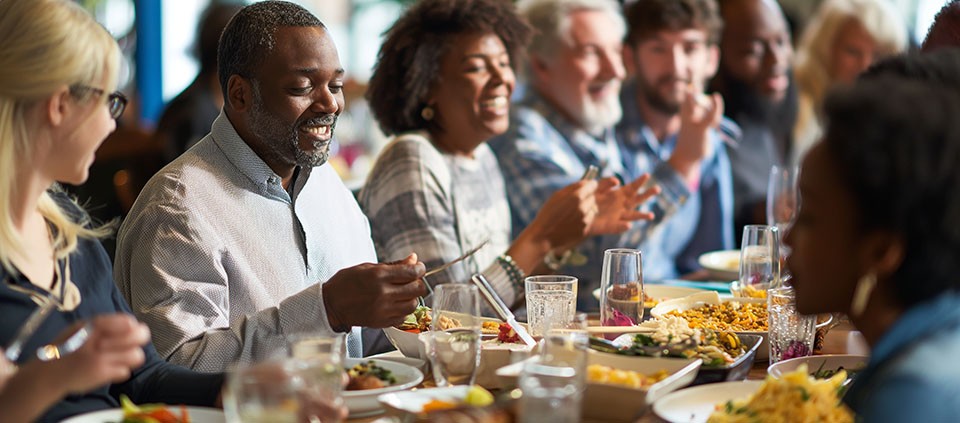Why We Need to Talk About Death (Over Dinner)

by Reyna Eisenstark
If you’ve practiced yoga, you are familiar with Savasana, the final resting pose, which literally translates as Corpse pose. I once had a yoga teacher explain that, as we got into Corpse pose and completely relaxed, we were, in a sense, practicing dying. I’m sure some people would find that explanation disturbing, but I found it extremely comforting. What if, at the very moment I was dying, I relaxed into Corpse pose and thought, Oh, right, I remember how to do this. Somehow my years of preparation could turn this potentially frightening moment into something familiar.
Not everyone is comfortable thinking about death in this way—or thinking about death at all. But Michael Hebb and Angel Grant want to change that. They lead workshops all over the world, guiding people to talk about death openly, in a relaxed atmosphere. They call their approach Death Over Dinner, and it’s a way to gather people together, without facilitators or therapists, to have a family or community discussion about death. Michael and Angel provide the tools to start the exchange, and from there, people take it in any direction they like.
According to Michael, “There is an ongoing conversation in almost everyone's head about death. The trick is to create a container, a setting, where the people in your life feel comfortable sharing their thoughts, hopes, and fears with you.” Michael and Angel believe that dinner is the right place for such a conversation: “Dinner is a natural place for difficult conversations—it has always been. We are just taking part in the long history of utilizing the table as a place of human connection and deep, thoughtful conversation.”
Death Over Dinner came out of Michael and Angel’s own experiences of death: Both lost their fathers early. As Angel explains: “We both, in hindsight, would have liked to have had the resources to navigate their dying processes differently. Hopefully, what we’ve built will allow us and others to navigate the death of loved ones and our own deaths in ways that feel complete.”
Though the theme of death is ever-present in our culture, talking about it has become somehow taboo. According to Angel, “Americans are obsessed with death, but they don’t talk to their families about what they actually want at the end of their lives.” But once people have a neutral, safe space, they find it much easier to dive into the topic. Michael says, “Being prepared for the end of life goes far beyond having the proper legal documents completed. We are deeply served by having conversations with our loved ones so they know how to take care of us and eventually honor us.”
As part of the program, Angel leads the participants in a death meditation. This includes talking through what actually happens in your body as you die. “Things shut down in a certain order,” she explains. “I personally didn’t want to go through this and have no idea what was happening to me.” She believes that this knowledge can help people overcome some of their fears about death, much as I found comfort in Corpse pose. As a yoga teacher, Angel sees Corpse pose as symbolizing the death of that particular practice: “Everything that came before that moment dies. It is a way to clearly see what’s already gone and to feel yourself in the moment.”
Turns out, the most surprising thing people discover when they participate in Death Over Dinner programs is that talking about death makes them feel more alive. As Michael puts it, “When we talk about our own mortality, we are really only discussing life. It is simply a mirror that allows us to clearly see how we want to live.” As people begin to openly talk about death, it opens a window for exploring where they’ve lost touch with what is truly important to them, Angel says. “They walk away with a clear knowledge of what matters to them most.”
Reyna Eisenstark is a freelance writer living in Chatham, New York. You can read her blog, inspired by stories from her life, at reynaeisenstark.wordpress.com.
© Kripalu Center for Yoga & Health. All rights reserved. To request permission to reprint, please email editor@kripalu.org.
